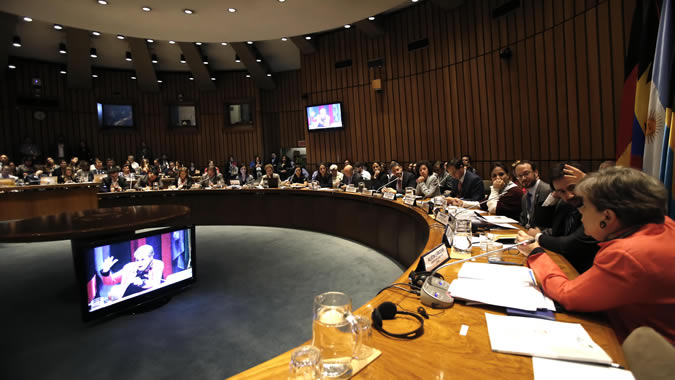Companies must Change Business Model to Adopt Sustainable Consumption and Production Patterns
During the second meeting of the Forum of Countries on Sustainable Development, representatives of the business sector reaffirmed their commitment to the 2030 Agenda and the SDGs.

Leaders of large companies and representatives from the Latin American and Caribbean business world met today at ECLAC with government authorities and international experts to assess private sector participation in fulfilling the Sustainable Development Goals (SDGs) agreed upon by the United Nations in its 2030 Agenda for Sustainable Development.
During the second meeting of the Forum of the Countries of Latin America and the Caribbean on Sustainable Development, underway at ECLAC headquarters in Santiago, Chile, participants in the meeting on “The role of the business sector in generating sustainable consumption and production patterns in Latin America and the Caribbean” all agreed that private sector participation is essential to the success of the goals stipulated in the Agenda.
Contributors during the meeting included Alicia Bárcena, Executive Secretary of the Economic Commission for Latin America and the Caribbean (ECLAC); Javier Cortés, Head of Local Networks for Latin America, the Caribbean and North America of the UN Global Compact; Gabriela Agosto, Argentina’s Executive Secretary of the National Council for the Coordination of Social Policies; Hans Eben Ivanschitz, General Manager, Unilever Chile; Nathan Monash, Vice President of Business Sustainability, Lundin Gold Inc. Ecuador; Leonor Esguerra, Shared Value Director, Bogotá Chamber of Commerce, Colombia; and Adriana Zacarías, Regional Coordinator of Resource Efficiency and Sustainable Consumption and Production, UNEP Regional Office for Latin America and the Caribbean.
Alicia Bárcena pointed out that private sector participation in the implementation of the 2030 Agenda is crucial and goes way beyond “corporate social responsibility.”
“This is about creating a new business model in Latin America and the Caribbean, because our current pattern of development is unsustainable and must change if we want to safeguard our planet and people’s lives,” the ECLAC senior official stressed.
In addition to mentioning the crisis of confidence among citizens in public institutions, according to recent reports, she warned that this distrust is also replicated in the case of private institutions. “This is why we must go beyond public-private partnerships, since this is about generating compacts that enable the creation of a new development paradigm,” she insisted.
In this sense, Bárcena proposed establishing three regional compacts with the business sector: one on responsible and sustainable food production to help preserve terrestrial ecosystems; another on sustainable energy, which involves moving toward increasingly intensive use of renewable energies; and finally, a compact for the transition from the material to the digital world, “just as proposed in the document Data, algorithms and policies: Redefining the digital world, which ECLAC just released during the Sixth Ministerial Conference on the Information Society in Colombia, in which private sector participation is essential,” she underscored.
Javier Cortés, in his remarks, cautioned that companies that do not align with the SDGs today put their own viability at risk, since the 2030 Agenda benefits them and generates greater business value. “In that sense, the Agenda is an opportunity,” he said.
“For all that, business models and value chains must transform toward sustainable consumption patterns. This means changing the internal culture of companies, including the way we advertise, without leaving innovation aside,” he said. “The business community can join the public policy dialogue on the compacts Alicia Bárcena mentioned, in a collaborative framework,” he added.
Gabriela Agosto, meanwhile, highlighted the commitment by her country’s government to the 2030 Agenda from day one and to sharing it with other actors.
“Dialogue is key, as well as an adequate institutional framework for the patterns of production and consumption we want. In Argentina, we must preach to small- and medium-sized companies in the framework of the 2030 Agenda. We also need to define new rules of dialogue between the State and the private sector. And highlight SDG 17, which calls for forming alliances to meet goals, as a way of conceiving development, a change of paradigm in and of itself,” stated the Argentine authority.
Hans Eben endorsed his corporation’s enthusiasm for the SDGs and called upon the business sector to incorporate them into its business models, since they establish a basic framework that can have clear impacts on society. By way of example, he mentioned that Unilever Chile has committed to using raw materials from 100% renewable sources in its processes by the year 2020 and to eliminating 7 million tons of waste so as to prevent it from ending up in landfills.
Related content
Related event
Type
Country(ies)
- Latin America and the Caribbean
Contact
Public Information Unit
- prensa@cepal.org
- (56 2) 2210 2040
